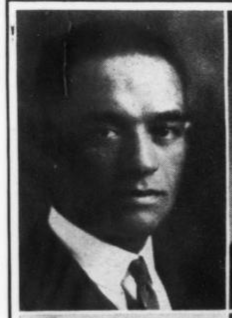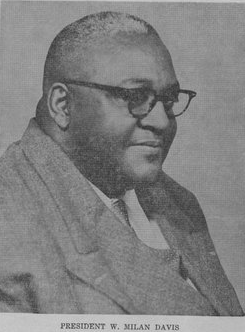Maurice Ethan Thomasson was born 5 May 1892 in Monticello, Arkansas, the son of James E. Thomasson, a shop owner, and Isabella Brooks Thomasson. After studying at Hampton Normal and Agricultural Institute, Maurice earned a Bachelor’s degree from Iowa State College in 1926. At that time, Thomasson was one of only 13 Black regular session students at ISC (“A Record,” 1926). He graduated along with classmates Compton Chapman, Benjamin Crutcher, and Willa Juanita Ewing.
followed by a Master’s degree in sociology from the University of Minnesota and a doctoral degree from Columbia University. Thomasson became a faculty member at Johnson C. Smith University, an HBCU in Charlotte, North Carolina, after earning his doctorate. In 1941, He took up his post at the Delaware State College for Colored Students (now Delaware State University).
Thomasson married La Verne Boyer on 4 June 1947, the year that his employing institution became known as Delaware State College. He and his wife taught sociology at the school, Delaware’s only HBCU, from the 1940s through the 1960s. After turmoil at the college surrounding student dissatisfaction regarding campus infrastructure that was unable to support the influx of World War II veterans on the G.I. Bill, Thomasson was appointed to serve as acting president of the college in 1949. He returned to his position as faculty head of sociology studies after the hiring of a new president in 1950 but was appointed a second time as acting president in mid-1951, the college wanting to tap him permanently for the role. Thomasson, however, turned down the offer, stating his desire to teach. (Holmes, 2014)
During this second term as Acting President, in 1952, Thomasson was called upon to testify at a landmark Delaware integration trial that considered consolidated court cases Gebhart v. Belton and Bulah v. Gebhart. Thomasson’s “sociological perspective” on segregated schools was recorded in the trial transcript:
I don’t think that in a segregated situation it is possible to produce a person who is fully normal, completely satisfactory. There are some conditions inherent in the segregated situation that just simply warp a person’s personality. Now, for one thing a person who goes to school in a segregated school goes to that school by virtue of the fact that the State of which he is a part has said he is inferior. That is, the State has embodied that in the law, and the law has been sustained by the courts. He is told as he goes there the school segregated by law that he is inferior. (Holmes, 2014).
Donald Evans, a former student of Thomasson’s, remembered his former professor’s demeanor as unsuited to being a president of a university: “He was a very nice man, but I don’t think he had the personality to be a (permanent) president of a University” (quoted in Holmes, 2014). For the rest of his academic career, Thomasson taught sociology before retiring from teaching in 1967.
He died on 8 September 1973 and was buried in Odd Fellows Cemetery in Smyrna, Delaware. Delaware State University’s Thomasson Hall and Maurice Thomasson Center are named after him.
Sources
Photo credit: A record of the Negro at college 1926. (1926, August). The crisis: A record of the darker races, p. 187.
A record of the Negro at college 1926. (1926, August). The crisis: A record of the darker races, p. 174.
Holmes, Carlos. (2014, Feb. 12). Dr. Maurice Thomasson carried on work during trying times, declined permanent president post. Delaware State University, Dept. of Human Ecology [Blog]. Accessed 12 Dec. 2021. [No longer available.]

